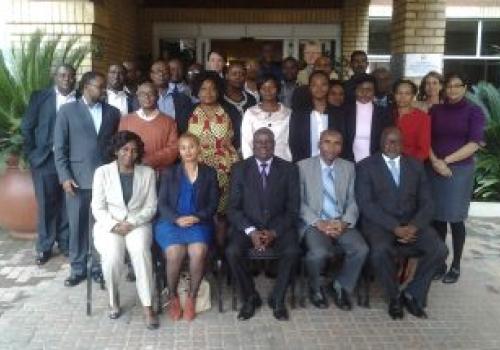Over 40 technocrats from SADC Member States drawn from the Ministries of Agriculture, Environment and Lands, the academia and private sector recently met for a three day workshop at Protea Hotel Centurion in Pretoria, South Africa. The workshop came at an opportune time when countries across the globe have committed to create a new international climate agreement by the conclusion of the U.N. Framework Convention on Climate Change (UNFCCC) Conference of the Parties (COP21) in Paris in December 2015. In preparation, countries have agreed to publicly outline what post-2020 climate actions they intend to take under a new international agreement, known as their Intended Nationally Determined Contributions (INDCs). The INDCs will largely determine whether the world achieves an ambitious 2015 agreement and is put on a path toward a low-carbon, climate-resilient future.
The need for every Party to the UNFCCC to develop its internally determined contributions emanated from the 18th Conference of the Parties to UNFCCC which took place in Doha, Qatar in December 2012. At this conference it was agreed that every country Party should commit to reduce emissions of Green House Gases that cause climate change. INDCs are therefore supposed to outline nationally determined areas and strategies for reducing carbon and other Green House Gas emissions that are based on national circumstances and would include issues of mitigation, adaptation, and enabling measure such as capacity building, financing and technology transfer. Submissions of INDCs by Countries to the UNFCCC commenced in March 2015 and are due latest by 1st October 2015.
The workshop, whose theme was ”Fulfilling the Region’s Undertakings to the Global Community: Towards Communicating Intended Nationally Determined Contributions by SADC Member States”, was organised by the SADC Secretariat under the auspices of the Programme on Climate Change Adaptation and Mitigation in the Eastern and Southern Africa (COMESA-EAC-SADC) Region in the Food, Agriculture and Natural Resources (FANR) Directorate. Its objective was to review progress on Intended Nationally Determined Contributions (INDCs) preparation processes in the region.
From 8th-10th April 2015, delegates were engaged in a rigorous debate about the meaning of INDCs and how each Member State had contextualised them to fit their national development and climate change response plans. Technical input from experts was given on emerging lessons in the production of INDCs in Africa. This included some insights from United Nations Framework Convention on Climate Change (UNFCCC) related decisions, processes and expectations on INDCs, Determining Adaptation needs and costs for Africa, and Adaptation Planning and Policy Analysis within the context of Southern Africa.
Experts included Mr Bernd Hackmann, Programme Officer - Mitigation, Data and Analysis Programme at the UNFCCC in Bonn, Germany; Mr Francois Engelbrecht from Center for Scientific and Industrial Research (CSIR); Mr Xolisa Ngwadla, Lead Negotiator of the African Group of Negotiators and Competency Area Manager -Global Change at CSIR; Professor Herald Winkler and Dr Marta Torres Gunfaus from University of Cape Town and Dr Webster Whande from the Climate and Development Knowledge Network (CDKN) in South Africa.
The workshop kick started with Member States presenting country reports on progress made in developing their INDCs. From this session, it was noted that all SADC Member States have started their INDCs development process with some countries being at very advanced stages thereby committing to prepare and communicate their INDCs well in advance of Conference of Parties (COP) 21. There was indication that all Member States would meet the UNFCCC deadline of 1st October 2015 for communicating their INDCs.
However, the process of preparing to develop INDC has not been without challenges. Notable among the difficulties that Member States have to grapple with is the limited technical capacity and financial resources to undertake thorough analysis and data collection for their INDCs. This scenario has been worsened difficulties in framing, customizing and communicating the scope and content of INDCs as well as difficulties in transforming already existing technical information into national contributions to be included in the INDCs. However, it was noted that Cooperating Partners including the UNDP, UNEP and USAID are providing financial and technical support to Member States to prepare their INDCs.
Responding to technical challenges tabled by Member States, the experts provided guidance on how countries would develop their INDCs. They stated among other things that INDCs need to be developed with considerations to fairness and equity whilst considering historical responsibilities, capabilities and development needs. To-date only the United States of America, Mexico, 28 Member Countries of the EU, Russia and Gabon in Africa have submitted their INDCs
It was noted from the workshop that SADC countries are committed to submit their INDCs before the deadline. All SADC Member States expressed willingness to support each other and share experiences and lessons in this novel process.

